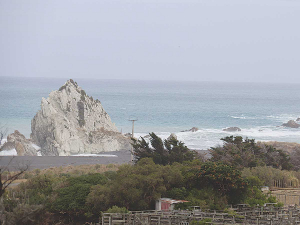Tim Ritchie - iconic meat industry leader dies
A man who dedicated his whole working life to the meat industry died suddenly on December 5.
 The stunning white rock formation that dominates the shoreline of White Rock Station, which the property is named after.
The stunning white rock formation that dominates the shoreline of White Rock Station, which the property is named after.
As well as the family reorganisation, Tim Ritchie and his cousin later invited well-known Wairarapa farmer and Romney breeder Derek Daniell to take a shareholding in White Rock.
The goal was to get it back to a state where it was a profitable and sustainable business.
Daniel’s Wairere Romney rams played a big part in lifting the station’s lambing percentage from just over 80% to the present 130%-plus.
Today, the 3800-ha farm runs 12,000 stock units, which is mix of sheep and cattle – the latter mainly Angus with a bit of Hereford in the mix.
The farm is summer dry, so there is an imperative to get the lambs off early to the store market and preserve the feed for the capital stock. Even the ewe lambs are grazed away from the farm and returned later for tupping. The same applies to grazing cattle off farm when there is a feed deficit.
“Having the capital stock – some 7000 breeding ewes and 400 cows – in good condition is the absolute focus of our business,” Ritchie says.
Another feature of White Rock is its all-weather airstrip.
Ritchie says when Derek Daniell came on board they undertook a major development programme to tackle scrub reversion – and the farm was in desperate need of lime, fertiliser and new grass seed. So, they constructed an all-weather concrete airstrip on one of the ridges above the farm.
It must surely rank as one of the seven wonders of the aviation world. It’s a downhill strip and the aircraft flies off the end of the ridge into the valley below. It would terrify most city types, but Ritchie says it means they are able to apply fertiliser at any time of the year.
It’s not just cattle and sheep, but advantage has been taken of the large areas of mānuka on the property to establish a lucrative mānuka honey operation. There are over 500 hives on the property, which provide White Rock with a significant income – especially since wool prices have fallen sharply.
Ritchie says the price they get for wool doesn’t even pay for the cost of shearing.
He says in terms of income, sheep are number one followed by cattle and mānuka honey.
Tickets are now available for Beef + Lamb New Zealand’s (B+LNZ) Out the Gate, returning from 19-21 May 2026 at Te Pae, Christchurch.
Dairy Women's Network (DWN) is welcoming AgriHealth as a new partner.
Northland Field Days patron Ross Newlove remembers the inaugural field days he attended 40 years ago.
Southland farmer Murray Donald has been appointed as chair of Safer Farms, the industry-led organisation focused on reducing harm, injuries and fatalities in the agricultural sector.
National Lamb Day returns this Sunday, 15 February, with Beef + Lamb New Zealand Inc calling on Kiwis to fire up their barbecues and celebrate the people and the product that put New Zealand on the world map.
When it comes to arranging the sound system at Northland Field Days, no one does it better than Colin Finlayson.

OPINION: Here w go: the election date is set for November 7 and the politicians are out of the gate…
OPINION: ECan data was released a few days ago showing Canterbury farmers have made “giant strides on environmental performance”.